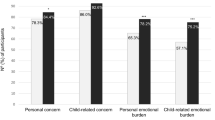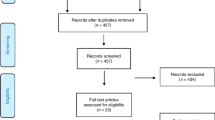Abstract
Background
This study aims to explore how Russian society perceives children with cancer and their families to determine its potential as a tool for solving the social struggles of cancer-affected youth.
Methods
The study took place between 2019 and 2020 and involved 237 parents of cancer-affected children enrolled for inpatient treatment in 5 pediatric oncology clinics in the North Caucasus Federal District (Russia). The study exploits a specially designed questionnaire survey as its main research method.
Results
About half of the parents did not observe changes in their attitude towards their child following a cancer diagnosis, with women more frequently noting these changes (40% vs. 18%). Public sentiment diverges between poles of sympathy and alienation: 53% acknowledge the expression of sympathy, while 39% perceive a sense of alienation. This study underscores the imperative for adequate support for these families, encompassing both financial and social dimensions.
Conclusion
The present findings can be used to design cancer awareness and anti-stigma programs aimed at educating the general population about the early symptoms of cancer, where to receive health consultation services, how to talk with and act around cancer-affected children, and how to support such children and their families.
Impact
-
Despite advances in modern medicine and multiple cases of pediatric cancer being successfully treated, stereotypes about the incurable nature of cancer still exist in many countries.
-
The present findings can serve as a platform for the comparative study of cancer-related issues in other regions and countries.
-
The results of this study can also be used to design cancer awareness and anti-stigma programs aimed at educating the general population about the early symptoms of cancer, where to receive health consultation services, how to talk with and act around cancer-affected children, and how to support such children and their families.
This is a preview of subscription content, access via your institution
Access options
Subscribe to this journal
Receive 14 print issues and online access
$259.00 per year
only $18.50 per issue
Buy this article
- Purchase on Springer Link
- Instant access to full article PDF
Prices may be subject to local taxes which are calculated during checkout


Similar content being viewed by others
Data availability
Data will be available on request.
References
Steliarova-Foucher, E. et al. International incidence of childhood cancer, 2001-10: a population-based registry study. Lancet Oncol. 18, 719–731 (2017).
Ward, Z. J., Yeh, J. M., Bhakta, N., Frazier, A. L. & Atun, R. Estimating the total incidence of global childhood cancer: a simulation-based analysis. Lancet Oncol. 20, 483–493 (2019).
WHO. CureAll framework: WHO global initiative for childhood cancer: increasing access, advancing quality, saving lives https://apps.who.int/iris/handle/10665/347370 (2021).
Allemani, C. et al. Global surveillance of cancer survival 1995–2009: analysis of individual data for 25,676,887 patients from 279 population-based registries in 67 countries (CONCORD-2). Lancet 385, 977–1010 (2015).
Coven, S. L., Stanek, J. R., Hollingsworth, E. & Finlay, J. L. Delays in diagnosis for children with newly diagnosed central nervous system tumors. Neurooncol. Pract. 5, 227–233 (2018).
Qaddoumi, I., Merchant, T. E., Boop, F. A. & Gajjar, A. Diagnostic delay in children with central nervous system tumors and the need to improve education. J. Neurooncol. 145, 591–592 (2019).
Kozlova, N. V. & Androsova, T. V. Socio-psychological support of cancer patients. Bull. Tomsk State Univ. 335, 142–147 (2010).
Cejtlin, G. Y., Guseva, M. A., Antonov, A. I. & Rumyancev, A. G. Medical and social problems of families with a child with cancer, and ways to solve them in the practice of pediatric oncology. Pediatrics 96, 173–181 (2017).
Pahl, D. A., Wieder, M. S. & Steinberg, D. M. Social isolation and connection in adolescents with cancer and survivors of childhood cancer: a systematic review. J. Adolesc. 87, 15–27 (2021).
Yoshida, K. & Matsui, Y. A pilot study for the development and evaluation of an educational program to reduce stigma toward cancer and cancer survivors: focusing on dating and marriage after cancer diagnosis. J. Cancer Educ. 37, 806–811 (2022).
Graetz, D. E., Garza, M., Rodriguez‐Galindo, C. & Mack, J. W. Pediatric cancer communication in low- and middle-income countries: a scoping review. Cancer 126, 5030–5039 (2020).
Daher, M. Cultural beliefs and values in cancer patients. Ann. Oncol. 23(Suppl 3), 66–69 (2012).
Janin, M. M. H., Ellis, S. J., Wakefield, C. E. & Fardell, J. E. Talking about cancer among adolescent and young adult cancer patients and survivors: a systematic review. J. Adolesc. Young-. Adult Oncol. 7, 515–524 (2018).
Vrinten, C., Gallagher, A., Waller, J. & Marlow, L. A. Cancer stigma and cancer screening attendance: a population based survey in England. BMC Cancer 19, 566 (2019).
Nahata, L. et al. Romantic relationships and physical intimacy among survivors of childhood cancer. J. Adolesc. Young-. Adult Oncol. 9, 359–366 (2020).
Mader, L., Michel, G. & Roser, K. Unemployment following childhood cancer. Dtsch Arztebl Int. 114, 805–812 (2017).
Kaul, P., Kumar, R., Singh, M. P. & Garg, P. K. Social taboos: a formidable challenge in cancer care. BMJ Case Rep. 14, e236095 (2021).
Gevandova, M. G. “I believe that everything will work out and my child will live like everyone else”: parents’ ideas about the future of a child who has had an oncological disease. Soc. Med. 1, 35–41 (2021).
Marklew, R. E., Jackson, A. A., Wiseman, M. J. & Wootton, S. A. ICONIC: an international task force supporting collaboration in nutrition and cancer globally. Trends Food Sci. Technol. 30, 3–10 (2022).
Newman, H. et al. Impact of poverty and neighborhood opportunity on outcomes for children treated with CD19-directed CAR T-cell therapy. Blood 141, 609–619 (2023).
Zapata-Tarrés, M. et al. Patient and health service factors associated with delays in cancer treatment for children without social security in Mexico. Pediatr. Blood Cancer 67, e28331 (2022).
Körver, S., Kinghorn, A., Negin, J., Shea-Perry, M. & Martiniuk, A. L. Assessing the experience of social support for parents who attended Camp Trillium’s pediatric oncology family program. J. Psychosoc. Oncol. 35, 1–16 (2017).
Guseva, M. A. Family stress and possibilities of psychological and social adaptation of the family in pediatric oncology. Soc. Med. 16, 18–22 (2017).
Reshetnikov, A., Gevandova, M., Prisyazhnaya, N. & Vyatkina, N. The role of parents in their child’s cancer diagnosis, treatment, rehabilitation, and socialization. Indian J. Pediatr. 91, 30–34 (2024).
Reshetnikov, A. V., Gevandova, M. G. & Prisyazhnaya, N. V. Peculiarities of legal regulation of oncological care for children in Russia and abroad. Med. Bull. North. Cauc. 14, 412–417 (2019).
Park, M., Choi, E. K., Lyu, C. J., Han, J. W. & Hahn, S. M. Family resilience factors affecting family adaptation of children with cancer: a cross-sectional study. Eur. J. Oncol. Nurs. 56, 102078 (2022).
Tonorezos, E. S. et al. Long-term care for people treated for cancer during childhood and adolescence. Lancet 399, 1561–1572 (2022).
Weller, L. J. R., Cavers, D. G. & Rowa-Dewar, N. Parents’ perceptions and experiences of physical activity in childhood cancer survivors in Singapore: a qualitative study. Singapore Med. J. https://doi.org/10.4103/singaporemedj.SMJ-2022-122 (2023). Epub ahead of print.
Shanmugavadivel, S. et al. 156 ‘Even now as a Mum, I don’t know what ‘just viral’ means’: parental perceptions of childhood cancer, the ChIP study. Arch. Dis. Child. 108(Suppl 2), A285–A286 (2023).
Ochoa, C. Y. et al. Barriers and facilitators of Hispanic/Latino parents caregiving for a childhood cancer survivor: a qualitative study. Cancer Causes Control 34, 151–160 (2023).
Wechsler, A. M. & Sánchez‐Iglesias, I. Psychological adjustment of children with cancer as compared with healthy children: a meta-analysis. Eur. J. Cancer Care 22, 314–325 (2013).
Funding
This research did not receive any specific grant from funding agencies in the public, commercial, or not-for-profit sectors.
Author information
Authors and Affiliations
Contributions
All authors contributed to the study’s conception and design—conceptualization: A.R., M.G., K.S. and G.D. performed material preparation, data collection, and analysis. The first draft of the manuscript was written by N.P., N.V. and all authors commented on previous versions of the manuscript. All authors read and approved the final manuscript.
Corresponding author
Ethics declarations
Competing interests
The authors declare no competing interests.
Ethical statement
All survey participants provided informed consent before enrollment in the study. The participating families were guaranteed anonymity and confidentiality. The study was conducted by international ethics standards and approved by the Ethical Committee of the Federal State Autonomous Educational Institution of Higher Education I.M. Sechenov First Moscow State Medical University of the Ministry of Health of the Russian Federation (Sechenov University) (Protocol No. 22–21, dated 02.02.2019).
Consent to participate
Participants signed informed consent.
Additional information
Publisher’s note Springer Nature remains neutral with regard to jurisdictional claims in published maps and institutional affiliations.
Rights and permissions
Springer Nature or its licensor (e.g. a society or other partner) holds exclusive rights to this article under a publishing agreement with the author(s) or other rightsholder(s); author self-archiving of the accepted manuscript version of this article is solely governed by the terms of such publishing agreement and applicable law.
About this article
Cite this article
Reshetnikov, A., Gevandova, M., Prisyazhnaya, N. et al. Public perceptions of families affected by pediatric cancer and educational work in pediatric oncology. Pediatr Res (2024). https://doi.org/10.1038/s41390-024-03179-3
Received:
Revised:
Accepted:
Published:
DOI: https://doi.org/10.1038/s41390-024-03179-3



